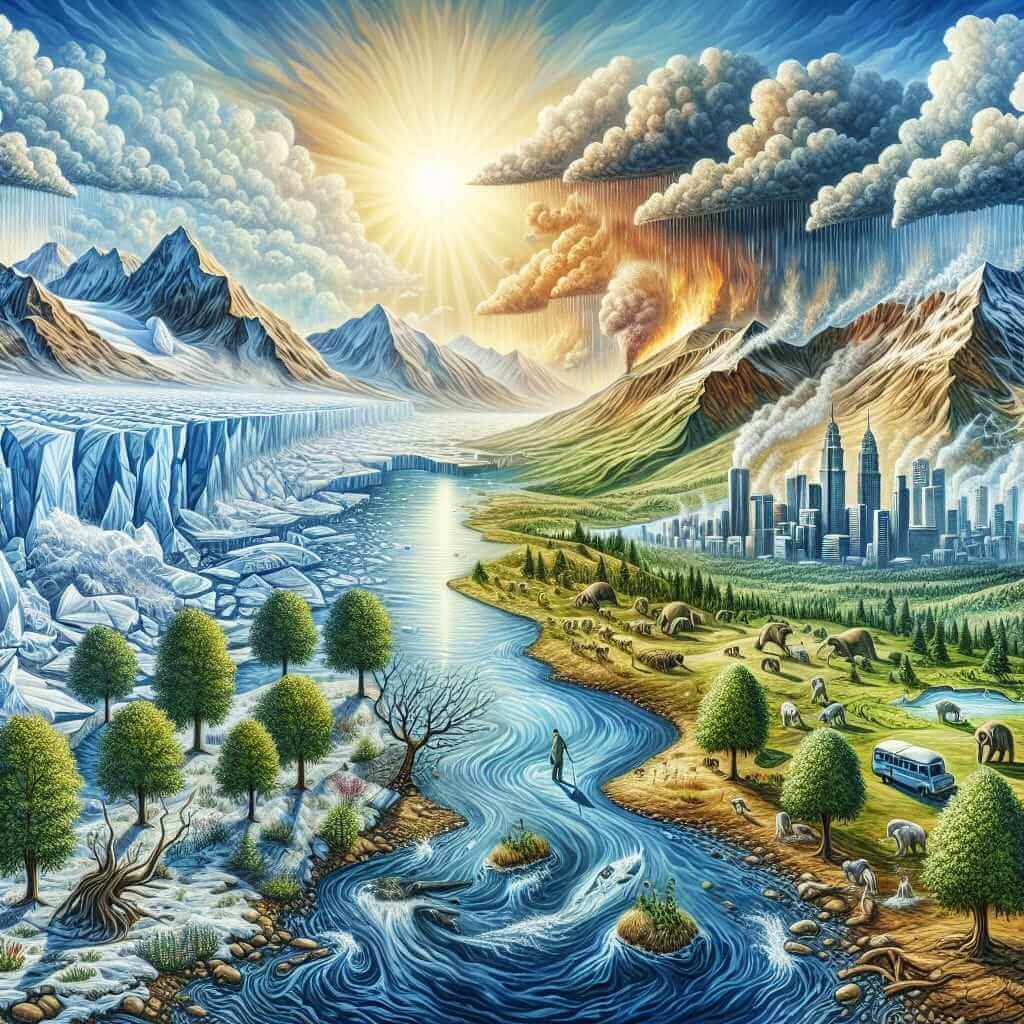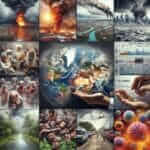The IELTS Reading test is an essential part of the examination, often featuring topics that reflect current global issues. “What are the impacts of climate change on water resources?” is a topic that stands out due to its relevance and the increasing interest it garners both in academia and mainstream media. Due to its pertinence, it is highly likely that candidates may encounter similar topics in future exams.
This article provides a comprehensive Reading passage along with an array of IELTS-style questions and detailed answer explanations, aimed at aiding learners in their preparation for the IELTS Reading test.
Reading Passage: Impacts of Climate Change on Water Resources
Climate change significantly affects global water resources, posing substantial risks to both natural ecosystems and human communities. As global temperatures continue to rise, the hydrological cycle is disrupted, leading to a complex array of consequences. This passage examines some critical impacts of climate change on water resources, emphasizing various aspects such as water availability, quality, and ecological balance.
Increasing Frequency of Extreme Weather Events
One of the most visible impacts of climate change is the increasing frequency of extreme weather events, including heavy rainfall, storms, and prolonged droughts. These events can lead to severe water scarcity or flooding, affecting water availability for agriculture, industry, and domestic use. Changes in precipitation patterns have led to regions experiencing either intense rainfall or prolonged periods of drought, both of which can have devastating effects on water supply.
Melting Glaciers and Ice Caps
Glaciers and ice caps serve as significant freshwater reserves. However, rising global temperatures have accelerated the melting of these ice formations, leading to a reduction in freshwater availability. The melting glaciers result in rising sea levels and the alteration of freshwater flows into rivers and lakes, impacting both human and ecological water needs.
Groundwater Depletion
Groundwater resources are increasingly under stress due to over-extraction and reduced recharge rates. With less precipitation infiltrating groundwater reserves, the pressure on these critical water sources intensifies. Many communities worldwide rely on groundwater for drinking and irrigation. The depletion of this resource can lead to severe consequences, including land subsidence and the loss of fertile land.
Water Quality Degradation
Climate change impacts not only water quantity but also water quality. Increased temperatures can lead to higher rates of water evaporation, concentrating pollutants in smaller volumes of water. Moreover, extreme weather events can result in the contamination of water supplies through runoff that carries pollutants from agricultural fields, urban areas, and industrial sites. This deterioration in water quality poses significant health risks to humans and aquatic life.
Ecological Impact
Water ecosystems are particularly vulnerable to changes in water flow and quality. Altered patterns of precipitation and temperature can disrupt the life cycles of various aquatic species, affecting biodiversity and ecosystem health. Changes in water temperature and chemistry can influence the reproduction and survival rates of fish and other aquatic organisms, ultimately impacting the entire food web.
 Climate Change Water Impacts
Climate Change Water Impacts
Questions
Multiple Choice
-
What is one of the most visible impacts of climate change on water resources?
- A) Increasing global temperatures
- B) Rising sea levels
- C) Increasing frequency of extreme weather events
- D) Melting glaciers
-
How does climate change affect groundwater resources?
- A) Increases recharge rates
- B) Reduces over-extraction
- C) Leads to land subsidence
- D) Less precipitation infiltrates reserves
True/False/Not Given
- Climate change has no significant impact on water quality. (True/False/Not Given)
- Increased evaporation due to higher temperatures can concentrate pollutants in water. (True/False/Not Given)
- Melting glaciers have no effect on freshwater flows into rivers and lakes. (True/False/Not Given)
Matching Headings
Match the following headings to the appropriate paragraphs:
- (Heading i) Increasing Frequency of Extreme Weather Events
- (Heading ii) Water Quality Degradation
- (Heading iii) Ecological Impact
- (Heading iv) Groundwater Depletion
- (Heading v) Melting Glaciers and Ice Caps
Sentence Completion
Complete the sentences below with a word or phrase from the passage:
- Glaciers and ice caps are significant ___ reserves.
- Runoff from ___ and industrial sites can contaminate water supplies.
Summary Completion
Complete the summary below using words from the box:
Climate change affects global water resources through various processes. The of glaciers and ice caps contributes to rising sea levels and alters freshwater flows. Consequently, disruption can result in water scarcity or flooding. Additionally, ___ events contribute to water quality degradation, which poses health risks.
- melting
- extreme weather
- precipitation
- temperature
Answer Key and Explanations
-
C) Increasing frequency of extreme weather events
Explanation: This is mentioned in the first paragraph under the subheading “Increasing Frequency of Extreme Weather Events.” -
D) Less precipitation infiltrates reserves
Explanation: This is explained in the section “Groundwater Depletion,” where it states that reduced recharge rates lead to stress on groundwater resources. -
False
Explanation: The passage clearly states that climate change impacts water quality, concentrating pollutants in smaller volumes of water. -
True
Explanation: The passage mentions that increased temperatures lead to higher rates of evaporation, which concentrates pollutants in the water. -
False
Explanation: The passage discusses that melting glaciers affect freshwater flows into rivers and lakes. -
Increasing Frequency of Extreme Weather Events
-
Water Quality Degradation
-
Ecological Impact
-
Groundwater Depletion
-
Melting Glaciers and Ice Caps
-
freshwater
-
agricultural fields
Summary Completion:
- melting
- extreme weather
- precipitation
Common Mistakes to Avoid
- Misinterpreting True/False/Not Given questions by assuming information not stated in the text.
- Overlooking specific details in the passage, leading to incorrect answers in Multiple Choice questions.
- Confusing similar headings in the Matching Headings section.
Vocabulary
- Hydrological (adj.) [ˌhaɪdrəˈlɒdʒɪkəl]: related to the study of the movement, distribution, and quality of water on Earth.
- Exacerbate (v.) [ɪɡˈzæsəbeɪt]: to make a problem, bad situation, or negative feeling worse.
- Recharge (n.) [riːˈtʃɑːdʒ]: the process by which water is added to an aquifer or other body of groundwater.
Grammar
- Conditional Sentences: If global temperatures continue to rise, the hydrological cycle will be disrupted.
- Passive Voice: Water quality is affected by climate change.
Tips for High IELTS Reading Scores
- Practice regularly with passages on current global issues.
- Pay attention to time management, aiming to complete each passage within 20 minutes.
- Develop strategies for different question types, such as skimming for Multiple Choice questions and scanning for Matching Headings.
By following these guidelines and practicing with realistic IELTS-style passages, candidates can enhance their reading skills and improve their chances of achieving a high score on the IELTS Reading test.


